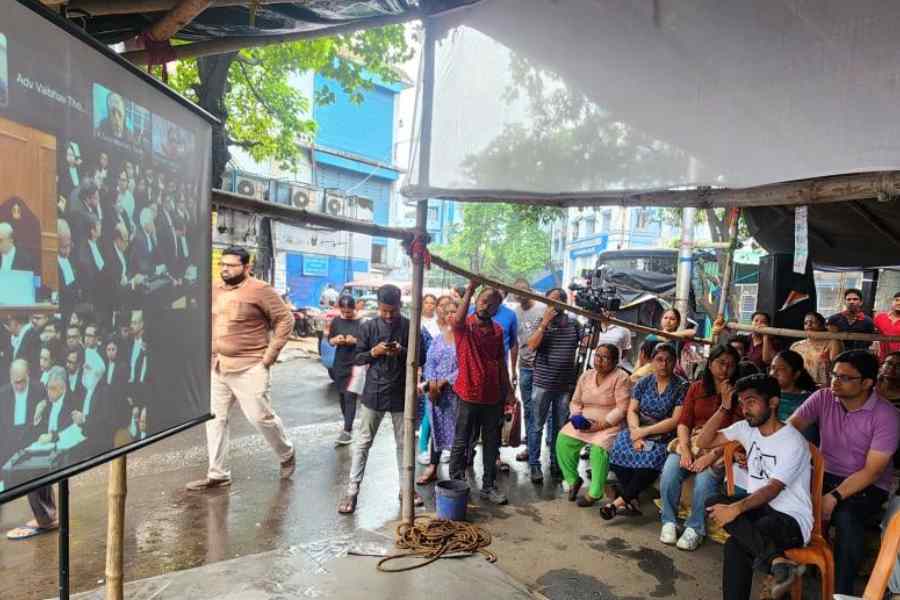The Supreme Court on Tuesday grilled the Bengal government on the delay in registering an FIR in the RG Kar rape-and-murder and the immediate reappointment of the medical college’s principal Sandip Ghosh, after his controversy-fuelled resignation, as principal of another medical college.
The rape and murder of the 31-year-old postgraduate trainee at the RG Medical College and Hospital has “shocked (the) nation’s conscience”, a three-judge bench headed by Chief Justice of India D.Y. Chandrachud said, announcing measures for medical professionals’ safety countrywide.
For RG Kar, specifically, it directed CISF security, appearing to indicate a lack of confidence in Kolkata Police. Senior advocate Kapil Sibal, representing the Bengal government, said the state had no objections.
The top court, which had taken suo motu cognisance of the RG Kar atrocity, set up a 14-member National Task Force (NTF) to evolve protocols to prevent sexual attacks or other kinds of physical attacks on medical professionals.
The NTF has to ensure the installation of CCTVs at all entry and exit points at hospitals countrywide, and the establishment of an internal complaints committee at every hospital to deal with allegations of sexual harassment of women medical personnel, including students and nurses.
The bench, which included Justice J.B. Pardiwala and Justice Manoj Misra, directed the CBI to submit a status report on its probe by Thursday. The Bengal government, too, must file a report by Thursday on the progress of investigations into the vandalism at RG Kar, in the presence of police, on August 14-15 night.
On Ghosh’s reappointment as principal of the Calcutta National Medical College, the court asked: “When the conduct of the principal is under scrutiny, how was the same principal appointed as a principal of another college immediately?”
It asked the Bengal government against taking any coercive action against peaceful protesters: “…We also direct that let not the power of state of West Bengal be unleashed on the protesters whether they are doctors, members of civil society or lawyers....”
The state government faced searching questions on the FIR delay.
“It appears the crime was detected in the morning, yet the principal and the hospital staff tried to pass it off as suicide and the parents were not even allowed to see the body for several hours,” Justice Chandrachud said during the two-hour special hearing.
“The incident occurred in the morning. The autopsy was conducted between 1.45pm (and) 4pm, which revealed the victim was murdered,yet the FIR was lodged at 11.45pm, that too three hours after the body was crematedat 8.30pm.”
Sibal responded that the family had not lodged any FIR.
“The parents were not in the hospital when the incident took place. The onus was on the hospital to lodge the FIR,” the CJI said.
How could a mob of 7,000-odd people vandalise the hospital on August 14-15 night despite police presence, the court asked.
“How did the mob gather and vandalise the hospital and equipment? Kolkata Police do not know it? What were the police personnel doing? We are very, very concerned,” the CJI said.
In a written order, the bench said: “We are unable to comprehend how the State was not prepared to deal with the incident of vandalization (sic) of the premises ofthe hospital.”
It expressed concern over the disclosure of the identities of the RG Kar victim and her family in the media despite penal provisions for such revelations, prohibited by multiple apex court judgments.
The court highlighted the growing attacks on doctors by patients and their families across the country – mentioning recent incidents in Bengal, Bihar and Hyderabad — and the lack of adequate facilities for medical professionals at their hospitals.
“Women are at particular risk of sexual and non-sexual violence in these settings. Due to ingrained patriarchal attitudes and biases, relatives of patients are more likely to challenge women medical professionals,” it said.
“In addition to this, female medical professionals also face different forms of sexual violence at the workplace by colleagues, seniors and persons in authority. Sexual violence has had its origins even within the institution, the case of Aruna Shanba(u)g being a case in point.”
Shanbaug, a young Mumbai nurse, was brutalised by a hospital employee inside the institution in 1973and spent almost 42 years in a vegetative state before her death in 2015.
The bench noted that several states — such as Maharashtra, Kerala, Karnataka, Telangana, Bengal, Andhra Pradesh and Tamil Nadu — had enacted laws to protect healthcare professionals from violence, making such offences non-bailable and punishable with three years in jail.
Yet these enactments do not address the institutional and systemic causes that underlie the problem, the court said. An enhanced punishment without improving institutional safety falls short of addressing the problem effectively, it added.
“The constitutional value of equality demands nothing else and will not brook compromises on the health, wellbeing and safety of those who provide healthcare to others. The nation cannot await a rape or murder for real changes on the ground,” the apex court said in its written order.











